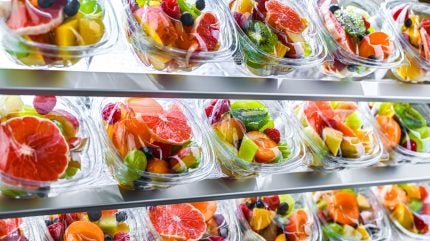
In the quest for sustainability, the packaging industry plays a pivotal role, particularly within the food and beverage sector.
As environmental, social, and governance (ESG) criteria continue to shape industry standards, understanding the balance between utilising resource-intensive materials and enhancing food preservation is crucial.
Brian Hawkins, Product Manager at Fortis Solutions Group, sheds light on these complexities in a detailed discussion about the future of packaging.
Weighing material choices against food waste
When it comes to packaging, the primary goal is always to protect the contents. As Brian Hawkins points out, “the environmental impact of wasted products greatly outweighs the effect of the packaging materials.”
This statement underscores a fundamental challenge for brands: choosing the right packaging materials that will ensure product safety and longevity without undue environmental cost.
Hawkins elaborates on several factors that brands must consider: “Material properties, such as how well the packaging protects the product from moisture, oxygen, and supply chain impacts, are vital.”
Furthermore, he emphasises the importance of food safety and consumer preferences, noting that “flexible packaging is a clear favourite of consumers for product freshness and storage.”
Educating stakeholders on sustainable packaging
Education plays a critical role in advancing sustainable practices within the packaging industry. According to Hawkins, the Flexible Packaging Association is at the forefront of this initiative.
He explains, “They provide outreach materials to packaging converters about the benefits of flexible packaging so that we can educate our customers and brands.”
The benefits of flexible packaging are significant: “It requires less energy to manufacture and transport, extends the shelf life of products, reduces waste, and causes less food waste to be sent to landfills.”
These factors are integral to reducing greenhouse gas emissions within the industry.
Hawkins illustrates the efficiency of flexible packaging by comparing transportation requirements: “Shipping an equivalent number of flexible packaging pouches requires a single truckload, while rigid containers require 24X that.”
Emerging trends and future directions
Looking ahead, Hawkins is optimistic about the potential for innovative packaging solutions to further enhance ESG performance. “The shelf life that packaging provides is an important deterrent to food waste,” he states.
Ongoing research and development are focusing on improving barrier properties while incorporating sustainable aspects into packaging materials.
Hawkins highlights the role of communication in these advancements: “Communicating that packaging is the foundation for the reduction in carbon footprints will be something material converters will continue to focus on.”
This approach not only involves developing new technologies but also ensuring that stakeholders understand the environmental benefits these innovations bring.
A crucial role in shaping a more sustainable future
As the packaging industry navigates the complexities of sustainability, the insights provided by experts like Brian Hawkins are invaluable.
By balancing the need for effective food preservation with the imperative to reduce environmental impacts, the industry can make significant strides towards achieving its ESG goals.
The ongoing education of consumers and industry stakeholders, coupled with the development of innovative packaging solutions, will undoubtedly play a crucial role in shaping a more sustainable future.



